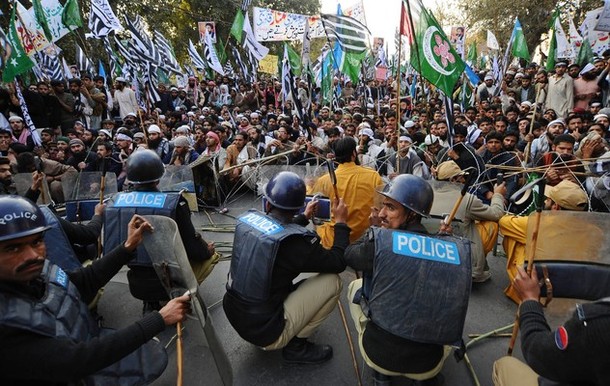
The recent assassination of governor Salman Taseer of Punjab in Pakistan has highlighted the ongoing and often violent battle for the future of the country. Taseer had spoken out in favour of reviewing and amending the nation’s blasphemy law to make it less susceptible to abuse, especially against minorities, and to reduce punishments by eliminating the death penalty.
Taseer’s own Pakistan People’s Party (PPP), which rules Pakistan, was itself not in favour of such a change, at least not publicly. Some religious parties termed Taseer himself a blasphemer and pronounced a death sentence on him that his own bodyguard carried out. Hundreds of lawyers in Pakistan have offered their services to defend the self-confessed assassin.
The Taseer assassination is a striking example of the battle between those who view with favour an emerging minority with a loud voice and even louder weapons – the Salafist and Takfiri (exclusionary) Islamists, influenced by extremist views born in Saudi Arabia – and the traditional syncretic and spiritual Muslims influenced by the moderate Barelvi school of thought of India, representing the largest single religious group in Pakistan.
But violence and its threat from the extremists have effectively silenced the majority. The extremists have successfully cowed politicians, intellectuals and opinion-makers alike, and steadily increased their hold over the public discourse. Even the majority religious leadership has been threatened. A case in point is Javed Ghamdi, one of Pakistan’s better-known moderate religious scholars with a large following among the urban elite and the middle class, who was recently forced to flee to Malaysia and to continue his commentaries from there.
The conflict between the extremist Islamists and moderate Pakistanis is coming to a head at a time that Pakistan is facing a serious economic crisis and its weak coalition government is being blackmailed by its own partners into conceding on key economic reforms. Pakistan’s internal struggles are likely to take a huge toll on its war against militancy on the western frontier with Afghanistan while also reducing the government’s ability to stop and reverse the economic meltdown that is occurring.
Against this background, the Pakistan army, the strongest and most disciplined institution in the country, is not ready to step into the political arena to change things even while it has won ground against the insurgency in the borderlands.
But its victories on the battleground could be, borrowing General David Petraeus’s recent words about Afghanistan, "fragile and reversible". Without a civilian government prepared to take over and administer the territories cleared by the military, it is quite possible that the army will be caught up in a neverending conflict. The combination of political uncertainty and economic distress will most certainly diminish national security, an outcome that Pakistan and the world at large can ill afford.
Meanwhile, the economy continues on a downward slide, creating conditions of disaffection and unrest that may force Pakistan over the edge in the very near future. A growth rate hovering at around 2 per cent – when 8-plus per cent is needed to provide sufficient jobs for the steadily growing young population – inflation running at nearly 25 per cent, and a fiscal deficit which could reach 8 per cent of GDP by June this year (against a budget target of 4.7 per cent) all point to a dire situation.
The good news is that the government has a strong economic team that has diagnosed the problems and identified the right solutions to a large extent. The bad news is that the political will to effect fundamental changes is missing. While Pakistan’s foreign friends and partners may be able to provide financial resources to stave off a total economic collapse, mainly because it is in their geopolitical interests to do so, unfortunately, political will cannot be imposed by the IMF.
The absence of political will among Pakistan’s leadership suggests that not only will the country face a dismal economic future but also a continuing rise of extremism – both of which would eventually tear the country apart.
Shuja Nawaz is Director of the South Asia Center at the Atlantic Council. Mohsin Khan is Senior Fellow at the Peterson Institute for International Economics in Washington DC. This article was originally published in The Australian. Photo credit: Getty Images.